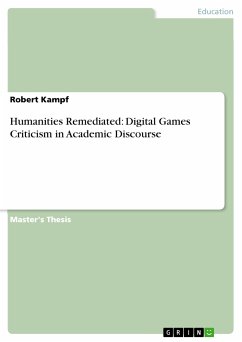Master's Thesis from the year 2010 in the subject Didactics for the subject English - Pedagogy, Literature Studies, grade: 1.3, University of Münster (English Department), language: English, abstract: Digital games are products of contemporary popular culture and indicators of social and cultural processes in modern computerized information societies. In recent years digital games asserted their status not only as a popular form of entertainment but also as virtual spaces for social interaction, escapism from reality, electronic sports and digital art. The first scientific studies of digital games date back to the late 1970s but recent debates about violence and addiction revived the interest in game research. The field of academic game studies describes the social, cultural, political, ideological, philosophical and psychological dimensions of digital games and their effects and influence on players. This paper presents an outline of game studies as academic school of thought and their role in scientific, public and political debates. The ambition of this paper is to demonstrate that game studies are a resourceful field of work and can be beneficial to the humanities. More importantly this work states that it is necessary to form an institutionalized frame of academic game research in order to retain the ability to describe and analyze a growing cultural and social phenomenon of unprecedented proportions. Without game studies, whole sectors of youth culture and virtual social networks will barely be accessible to academic research. Above that, the ability of digital games to imitate, explain and even influence real-world social systems is only a small part of the potential that will remain unexplored.
Dieser Download kann aus rechtlichen Gründen nur mit Rechnungsadresse in A, B, BG, CY, CZ, D, DK, EW, E, FIN, F, GR, HR, H, IRL, I, LT, L, LR, M, NL, PL, P, R, S, SLO, SK ausgeliefert werden.









